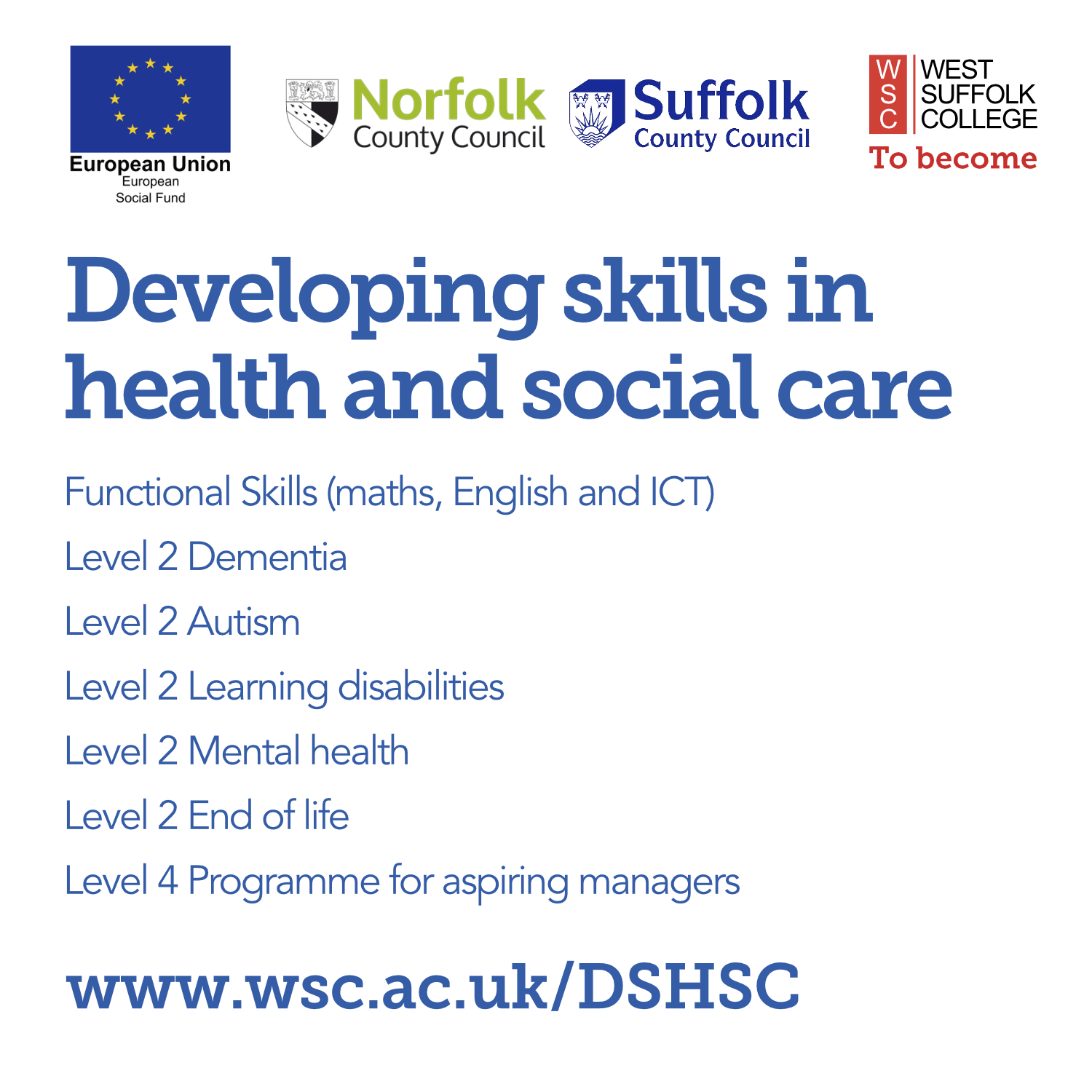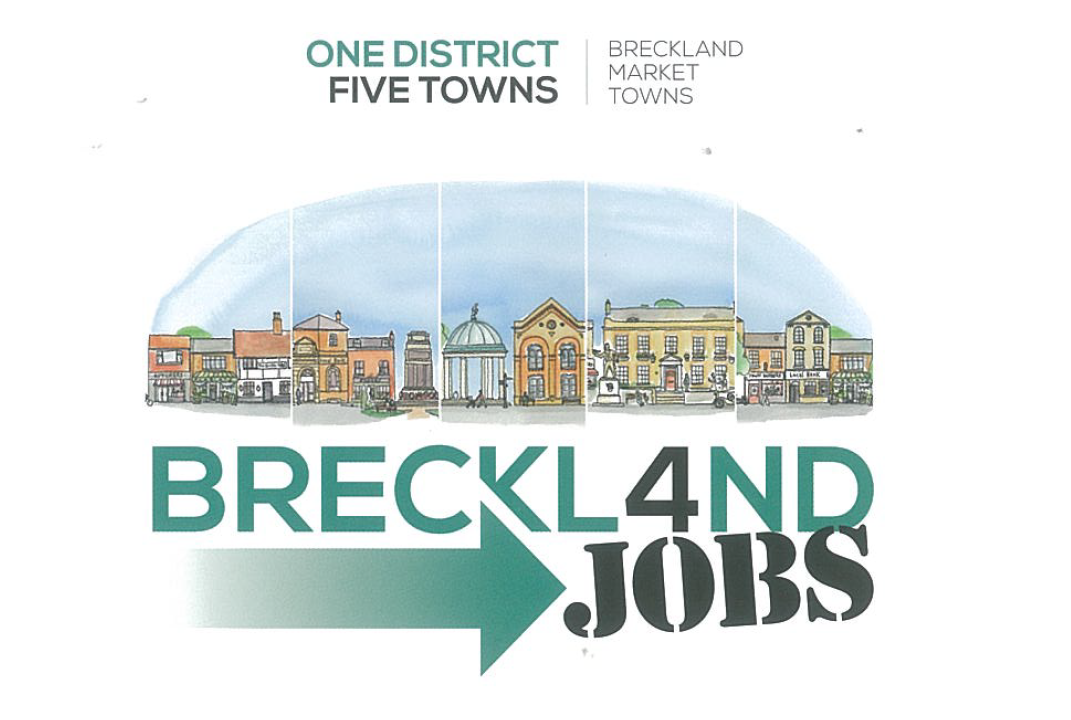
The Developing Skills in Health and Social Care (DSHSC) project provides fully funded training to staff working in the Health and Social Care sector across Norfolk and Suffolk.
West Suffolk College is part of this collaborative project, led by Norfolk and Suffolk County Councils, alongside a range of local colleges, training providers and other partners. The aim of the project is to empower those working in the health and social care sector to develop new skills, helping to continue providing high quality care to local people. The project team will work closely with health and social care providers to identify the best way to involve their staff in the project.
You can get involved in the project if you:
- Work in adult health and social care in Norfolk or Suffolk and are looking for development opportunities for yourself
- Are a manager or employer in adult health and social care and interested in training for your staff
- Provide voluntary or unpaid care to an adult
- Provide a service to adult health and social care through your employment. This includes emergency services personnel, and anyone making contribution to the sector.
Speak to our team: This email address is being protected from spambots. You need JavaScript enabled to view it. | 01284 716 246
Bitesize Courses
We are offering non-accredited bitesize courses on a range of topics as online morning sessions. These courses are open to everyone who may find the skills and knowledge useful in their work.
Diabetes Awareness
Diabetes is on the rise, with 5.3 million expected to be living with the condition by 2025. 90% of those with type 2. In addition, there are almost a million more people living with type 2 diabetes who don’t know they have it because they haven’t been diagnosed yet, bringing the total number up to more than 4.8 million. (Diabetes UK 2022)
We are offering this session to enable participants to develop their knowledge of diabetes and associated health implications to know different types of diabetes, their causes and treatment options. Participants will also understand how a person-centred approach can support an individual to manage their diabetes. The session is suitable for anyone looking to understand more about diabetes.
Training Dates
- TBC
All sessions 09:30am- 12pm through Microsoft teams.
Learning Disabilities and Dementia Awareness
People with learning disabilities are living longer, thanks to improvements in health and health care, although life expectancy for people with learning disabilities is still shorter compared with the general population. As a result, carers who look after people with learning disabilities are met with an increasing number who are developing dementia. (UK GOV 2022)
The aim of the session is to enable participants to develop their knowledge of how dementia affects people with a learning disability and to look at practical steps to support those living with and at risk of dementia. The session is open to anyone either working with adults with a learning disability or looking to develop their understanding.
Training Dates
- TBC
All sessions 09:30am- 12pm through Microsoft teams.
Level 2
Overview of Level 2 Units
-
Introduction to mental health, mental ill health and wellbeing
Credit value 3
GLH 20
This unit introduces learners to the concepts of mental health, mental ill health and wellbeing, as well as other related terminology and subjects, such as stigma and other associated impacts of mental illness. It aims to provide a learner with an understanding that all individuals have mental health and that an individual’s experience of mental health can fluctuate on a spectrum. It also introduces learners to basic treatment models, including self-help.
-
Dementia Awareness
Dementia Awareness
Credit value 2
GLH 7
The aim of the unit is to enable learners to gain knowledge of what dementia is, the different forms of dementia and how others can have an impact on the individual with dementia
-
Understand the context of supporting individuals with learning disabilities
Understand the context of supporting individuals with learning disabilities
Credit value 2
GLH 18
The unit explores the meaning of learning disability and considers issues closely linked with learning disability support. These include an awareness of how the attitudes and beliefs of others affect individuals who have learning disabilities. The unit introduces themes of inclusion, human rights, advocacy, empowerment and active participation and also considers the central place of communication in working with individuals who have learning disabilities.
-
Understand how to work in end of life care
Understand how to work in end of life care
The purpose of this unit is to assess the learner’s knowledge and understanding when beginning to work in End of Life Care.
Credit value 3
GLH 23
-
Introductory awareness of autistic spectrum conditions
Introductory awareness of autistic spectrum conditions
Credit value 2
GLH 17
The unit provides introductory awareness on autistic spectrum conditions. It provides learners with key areas of knowledge and explores important themes such as individuality, communication, behaviour and person centred support. The terminology chosen to describe the Autistic Spectrum in this unit is Autistic Spectrum Condition (ASC), one of several different usages in this field. In diagnosis and other clinical and research settings, the more usual term is Autism Spectrum Disorders (ASDs). Other usages, such as ‘autism’ as an umbrella term for the spectrum, are also frequently used informally and by organisations such as the National Autistic Society. ASC has been chosen here since it forms a more neutral and less medical phrase than ASDs in this context.
Training Dates
Dementia Awareness (9:30am - 1pm)
- TBC
Understand how to work in end of life care (9:30am - 1pm)
- TBC
Introductory awareness of autistic spectrum conditions (9:30am - 1pm)
- TBC
Introduction to mental health, mental ill health, and wellbeing (9:30am - 1pm)
- TBC
Understand the context of supporting individuals with learning disabilities (9:30am - 1pm)
- TBC
Chloe Stevenson, Patient Safety and Quality Team Administrator at West Suffolk Hospital, completed Level 2 course Understand the context of supporting individuals with learning disabilities
"Within my time at the West Suffolk Hospital, I had the opportunity to work alongside the wards with the Keeping in Touch Team during Covid time. I was able to support people during this difficult time and connecting them with their loved ones. I dealt with a few patients that had learning difficulties, and I was unable to show support where they were confused on the situation they were in.
"When the course was offered I was most interested in this course than the others that were available to do, as I felt this would help me in these types of situations where I struggled in communicating effectively. I enjoyed researching about this topic, as I believe within my future at the West Suffolk Hospital or elsewhere I will be able to have a much wider knowledge and doing courses like these are good for my development and will allow me to explore different fields."

Level 3
Understanding mental capacity and restrictive practice
Credit value 2
GLH 18
This unit aims to provide the learner with an understanding of the principles of mental capacity, including current legislation, codes of practice and how these principles interact. The learner will understand the rights of individuals and ways to support and promote their ‘best interest’ and when factors may influence the ability to express consent. The learner will explore strategies and skills that could be used to maximise individuals’ capacity to make their own decisions and understand restrictive practises and own roles following organisational policies and procedures in relation to restrictive practices
Training Dates (9:30am - 1pm)
- TBC
Understanding Parkinson’s disease within an adult care setting/service
Credit value 3
GLH 25
The aim of this unit is for the learner to understand Parkinson’s disease, common treatments and the effect of lifestyle choices on symptoms. The learner will understand how effective support can impact on the experience of the individual with Parkinson’s disease.
Training Dates (1pm - 4.30pm)
- TBC
Level 4
Highfield Level 4 Certificate in Principles of Leadership and Management for Adult Care (RQF)
All participants will need to attend all workshops (only once). All sessions are conducted through Microsoft teams.
- Workshop 1, 2 and 3: 09.30 - 13.00 (this will include induction/study skills & e-portfolio guidance)
-
What is it and who is it for?
The level 4 aspiring and empowering future leaders in health and social care
programme is designed for anyone looking to step up or already in a management/leadership role. The qualifcation consists of 6 units with specific emphasis on core knowledge in the following areas:
Leadership, regulatory processes, innovation and change, supervision/performance management , resource management and managing self.
-
How will I achieve the qualification?
You will attend 3 x 4 hour live online workshops to provide you with the knowledge and understanding to complete the assignments.
Further 1-1 support is available
-
Units that make up certificate
Unit 2: Team Leadership in Adult Care: Credit value 2
- Learners will Understand team leadership & team development in adult care.
Unit 4: Regulatory Processes for Adult Care: Credit value 2
Learners will.
- Understand key roles, remits and responsibilities in registered services
- Understand the systems and requirement for the regulation of adult care services.
- Understand the inspection process
- Understand the wider range of regulatory requirements that apply to the service
Unit 11: Supervision and Performance Management in Adult Care: Credit value: 1
Learners will:
- Understand supervision in adult care & procedures to address performance management issues
Unit 12: Resource Management in Adult Care: Credit value 2
Learners will
- Understand resource management issues
- Understand financial management arrangements
- Understand human resource issues
- Understand recruitment and retention
- Issues
- Understand how to analyse the impact of
- resource management on service delivery
Unit 17: manage Self for Leadership in Adult Care: Credit value 2
Learners will:
- Understand the importance of self-awareness
- Understand how to manage own behaviour
- Understand how to manage own workload
- Understand own role to champion the vision and values of the service
- Understand how to manage own learning and continuing professional development
Unit 20: Innovation and Change in Adult Care: Credit value 2
Learners will
- Understand how a vision for the service supports innovation
- Understand principles of effective change management
Training Dates
Workshop 1
- TBC
Workshop 2
- TBC
Workshop 3
- TBC
We are also offering two stand alone units from the Highfield Level 4 Certificate in Principles of Leadership and Management for Adult Care (RQF) programme:
Unit 11: Supervision and Performance Management in Adult Care
- TBC
Unit 4: Regulatory Processes for Adult Care
- TBC
Functional Skills
Our Functional Skills courses are delivered at our local Community and Business Centres in Bury st Edmunds, Ipswich, Haverhill, Sudbury and Thetford and are also available online. Click through below to find out more and contact the project team to book.





